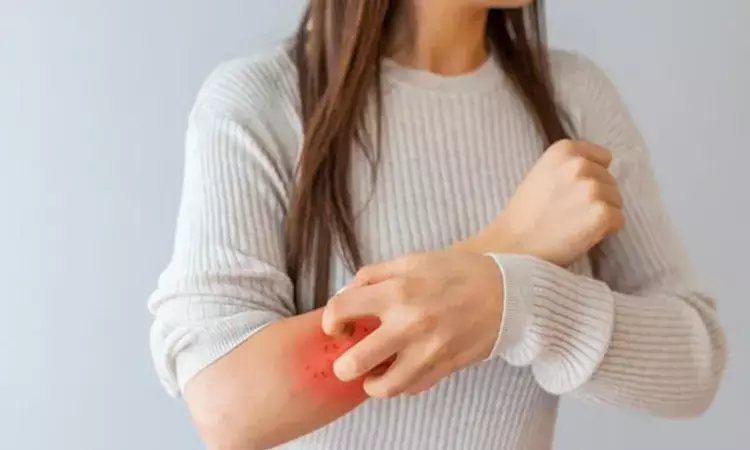- Home
- Medical news & Guidelines
- Anesthesiology
- Cardiology and CTVS
- Critical Care
- Dentistry
- Dermatology
- Diabetes and Endocrinology
- ENT
- Gastroenterology
- Medicine
- Nephrology
- Neurology
- Obstretics-Gynaecology
- Oncology
- Ophthalmology
- Orthopaedics
- Pediatrics-Neonatology
- Psychiatry
- Pulmonology
- Radiology
- Surgery
- Urology
- Laboratory Medicine
- Diet
- Nursing
- Paramedical
- Physiotherapy
- Health news
- Fact Check
- Bone Health Fact Check
- Brain Health Fact Check
- Cancer Related Fact Check
- Child Care Fact Check
- Dental and oral health fact check
- Diabetes and metabolic health fact check
- Diet and Nutrition Fact Check
- Eye and ENT Care Fact Check
- Fitness fact check
- Gut health fact check
- Heart health fact check
- Kidney health fact check
- Medical education fact check
- Men's health fact check
- Respiratory fact check
- Skin and hair care fact check
- Vaccine and Immunization fact check
- Women's health fact check
- AYUSH
- State News
- Andaman and Nicobar Islands
- Andhra Pradesh
- Arunachal Pradesh
- Assam
- Bihar
- Chandigarh
- Chattisgarh
- Dadra and Nagar Haveli
- Daman and Diu
- Delhi
- Goa
- Gujarat
- Haryana
- Himachal Pradesh
- Jammu & Kashmir
- Jharkhand
- Karnataka
- Kerala
- Ladakh
- Lakshadweep
- Madhya Pradesh
- Maharashtra
- Manipur
- Meghalaya
- Mizoram
- Nagaland
- Odisha
- Puducherry
- Punjab
- Rajasthan
- Sikkim
- Tamil Nadu
- Telangana
- Tripura
- Uttar Pradesh
- Uttrakhand
- West Bengal
- Medical Education
- Industry
Brain natriuretic peptide may have role in activating atopic dermatitis

USA: A recent study published in the Journal of Investigative Dermatology has revealed the role of brain natriuretic peptide (BNP) in activating atopic dermatitis (AD), or eczema.
The work by researchers from North Carolina State University could lead to more effective treatments for the condition.
Atopic dermatitis (AD) is a skin condition characterized by itching, irritated and thickened skin at the site of the irritation. The brain natriuretic peptide (BNP) is a peptide, or short chain of amino acids, that is elevated in patients with AD.
“BNP is expressed in sensory neurons, the neurons responsible for conveying sensation to the brain via the spinal cord,” says Santosh Mishra, associate professor of molecular biomedical sciences at NC State and corresponding author of the work. “We know from previous work that BNP helps translate the sensation of itch from the skin to the brain. In this work we wanted to see if BNP was involved in activating AD.”
In a chemically induced mouse model of AD, the researchers saw that mice without BNP did not exhibit the thickened or irritated skin commonly associated with AD, and their itching was reduced compared with control mice who did have BNP.
“The results show that BNP likely plays a role in itch activation,” Mishra says. “We next looked at BNP’s relationship to periostin, to see if we could determine how that activation takes place.”
Periostin is a protein that can interact with sensory neurons in the skin to activate itch response. It is produced in skin cells called keratinocytes and fibroblasts. Keratinocytes, in turn, have receptors for BNP, which are called NPR1 receptors. When the BNP receptors are activated, periostin is produced and itch can be turned on.
“But the interesting thing here is that the sensory neurons are the activator,” Mishra says. The neuron releases BNP, which activates keratinocytes with the NPR1 receptor, which then releases the periostin.
“This work shows that peripheral neurons, not just central neurons, are playing a role in AD – it begins in the sensory neurons and cascades from there,” Mishra adds. “It also points to some potential therapeutic strategies, such as blocking BNP’s ability to bind to NPR1 receptors in the skin.”
Reference:
Joshua J. Wheeler, Nidha Williams, Junho Yu, Santosh K. Mishra,Brain Natriuretic Peptide Exerts Inflammation and Peripheral Itch in a Mouse Model of Atopic Dermatitis, DOI:https://doi.org/10.1016/j.jid.2023.09.273.
Dr Kamal Kant Kohli-MBBS, DTCD- a chest specialist with more than 30 years of practice and a flair for writing clinical articles, Dr Kamal Kant Kohli joined Medical Dialogues as a Chief Editor of Medical News. Besides writing articles, as an editor, he proofreads and verifies all the medical content published on Medical Dialogues including those coming from journals, studies,medical conferences,guidelines etc. Email: drkohli@medicaldialogues.in. Contact no. 011-43720751


